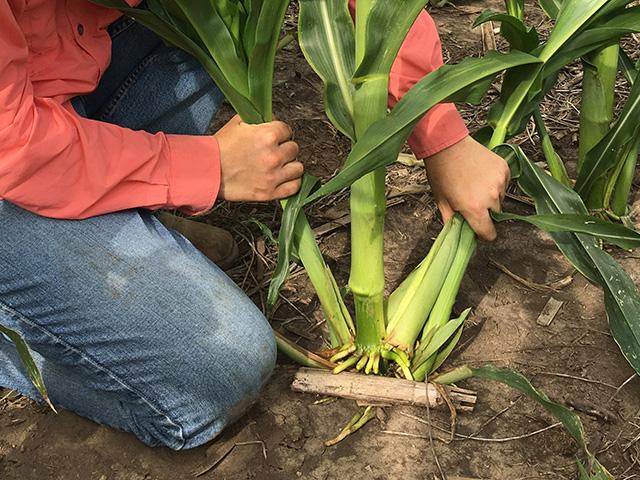Jenkins' Favorite Story of 2023
Tiller Research Offered Glimpse Into Corn's Unlocked Potential
Editor's Note:
The end of 2023 naturally had us thinking back over the year that was, including the stories we've created. So, we've again asked DTN/Progressive Farmer writers to think back on their year and choose a favorite story from the archive. They range from hard-hitting investigative journalism and national scoops to farm family features and fun discoveries made while traveling U.S. farm country. We hope you enjoy our writers' favorites, with today's story by DTN Crops Editor Jason Jenkins.
**
JEFFERSON CITY, Mo. (DTN) -- I guess you could say that I'm a "sucker" for a story like this.
Back in June, I came across a blog written about research on corn tillers -- aka "suckers" -- that a graduate student at Kansas State University had conducted. The topic intrigued me. With all the millions of dollars invested into developing high-yielding, resilient corn hybrids, was the jury still out on whether tillers were good or bad for your crop?
So, I called up the researcher, Rachel Veenstra, now an assistant professor of crop science at K-State, and we chatted about her three-year project -- work that earned her a unique title in social media circles.
"On Twitter, farmers started calling me the 'Tiller Queen,'" she told me. "I just kind of went with it. I don't know if it's something to be proud of or ashamed of, but it's stuck. People might not know my name, but they know my research."
P[L1] D[0x0] M[300x250] OOP[F] ADUNIT[] T[]
While prevailing opinion considered corn tillers detrimental to the crop, Veenstra explained that there wasn't much research on tillers, especially with modern hybrids. So, she explored the yield effect of tillers on two different corn hybrids planted at three different populations at 17 locations across Kansas for three years.
The result? Tillers didn't cause any yield reductions.
The researcher concluded that corn plants will put on tillers early in the season when resources are available in greater quantities than can be used by a single stalk. Later in the season, if the plant runs low on any of these resources, it can cannibalize what it needs from its tillers.
"A corn plant that's putting on tillers, well, that's just a very, very happy corn plant," she said back in June. "If you see tillers, don't panic."
The Tiller Queen and her research is my favorite story of the year for a couple of reasons. First, it demonstrated that basic research conducted at land-grant universities is still vital to advancing scientific understanding that directly benefits farmers.
Second, it showed that, while corn yields have increased incrementally over time, there's still more to be learned as we unlock corn's full potential. In the 1980s, it was estimated that corn had a theoretical maximum yield of 502 bushels per acre (bpa). Yet, today, some who participate in the National Corn Growers Association Yield Contest have surpassed that tally. Just this month, farmer David Hula of Charles City, Virginia, set a new world record with an entry yielding 623.8439 bpa.
Ironically, when Hula spoke to DTN Crops Technology Editor Pamela Smith about his record corn yield, he noted that it was the number of tillers he found early in the season that provided a clue that he might have a winner. As Veenstra might have advised, he didn't panic; he knew he had "happy" corn plants in that field.
Though the ear resulting from the tiller wasn't as large as the primary ear, Hula said it added supplemental bushels that contributed to the record-setting yield.
Hula's entry was Pioneer P14830VYHR, a 114-day hybrid that was new to him this year and commercially available on a limited scale in 2023. Coincidentally, Veenstra's tiller project was supported by the Kansas Corn Commission and Corteva Agriscience. Did something gleaned from the Tiller Queen's research help develop the hybrid with which the "Corn King" set the new yield record? Who knows, but it's fun to think that there might be a royal corn connection.
Read my original story on Veenstra's corn tiller research here: https://www.dtnpf.com/…
A summary of Veenstra's research can be found here: https://bookstore.ksre.ksu.edu/…
Read how tillers contributed to David Hula's world record corn yield here: https://www.dtnpf.com/…
Jason Jenkins can be reached at jason.jenkins@dtn.com
Follow him on X, formerly known as Twitter, @JasonJenkinsDTN
(c) Copyright 2024 DTN, LLC. All rights reserved.






